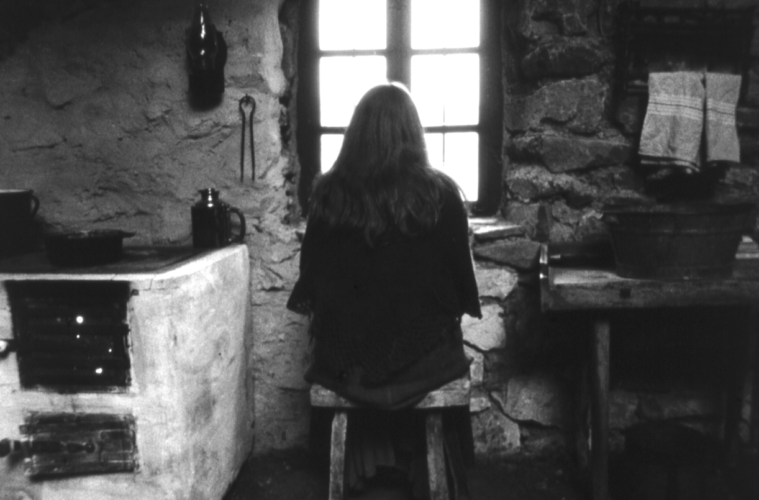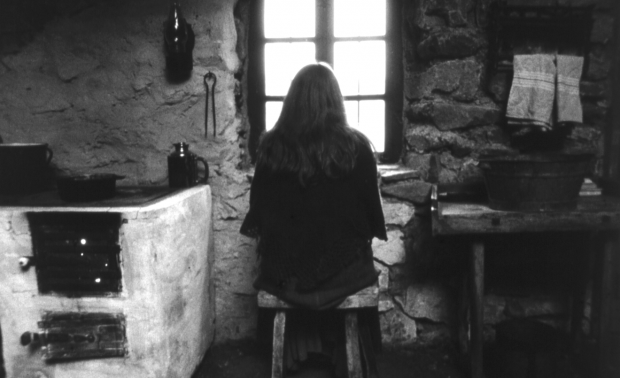The opening event of Béla Tarr‘s The Turin Horse may, perhaps, set up false expectations for many a viewer — set over a pitch-black screen, a coarse-grained voice-over recounts the demise of the life of Friedrich Nietzsche, which, according to the story (as well as popular belief, in some sense), was initiated by the philosopher’s lamented reaction to a cab driver’s whipping of an unresponsive horse. The incident took place on January 3, 1889, and was followed by ten years of catatonic inactivity for Nietzsche.
The most obvious reason why this introduction might tweak viewers’ expectations in the wrong direction is the presence of words. While the curtain-raiser is sustained, without imagery, by an off-screen articulation, the rest of the film — maybe ever-so-slightly ironically — is the exact opposite. It’s image-driven, with unimaginably long takes (often exceeding five minutes) and with an almost complete aversion to dialogue. Even the one discussion-centered sequence in the film feels more like a premeditated soliloquy for actor Mihály Kormos (a recurring presence in Tarr‘s canon) than an actual conversation.
Providing the roar for the rest of the film, then, generally falls on the shoulders of composer Mihály Vig, whose barbarically rough score, accentuated by an oft-repeated melody of yearning, ingrains itself so deeply that it could seem to become the film’s main character. There are, however, two principal beings that more logically fit that description — Ohlsdorfer (János Derzsi), the agressive, gruff cabby from the Nietzsche story, and his daughter (Erika Bók).
The film introduces us to the central duo — presumably in the late 19th century, shortly after the voiced-over event occurs — just as a vigorous windstorm is sweeping its way through the Italian countryside. As such, the titular beast is reluctant to take on the surrounding territory, leaving father and daughter with microscopically little to do in the meantime. (We actually only see the horse in action once, during the bravura inaugural shot.)
In turn, what Tarr‘s 146-minute film gives us is a fastidiously real-time presentation of the day-to-day occurrences of these two people. They wake up. She helps him get dressed. She gets water from the nearby well. They share a meal of potatoes. (If you thought Brad Pitt was the king of on-screen snacking, wait until you see the forcefulness with which Derzsi gnaws on his food.) Round and round we go, with Vig‘s commanding hymns and Fred Kelemen‘s stunningly stringent black-and-white cinematography lending these mundane proceedings an aura of substance.
The prizes of The Turin Horse — most powerfully, its uncompromisingly moving meditation on the value of the fibers of human existence (yes, it’s rather lofty) — are extremely hard-earned, and require a kind of devoted patience. (If your showing doesn’t have at least one walk-out, I’ll buy you a cup of coffee.) The lack of a developing storyline, in the conventional sense, is a rough obstacle at first — by the third day, you’ll surely be wondering why we need to see this guy put his boots on again — but once the reasons behind Tarr‘s design are crystallized, the potential rewards are as vast and far-reaching as the film’s all-encompassing rural landscape.
Tarr, 56, has announced that this will be his final film. If that statement holds true, it’s one that feels entirely appropriate after witnessing the experience of The Turin Horse, which marks an immaculate meshing between a director’s formal techniques and his thematic excitements. (László Krasznahorkai, it should be stated, co-wrote the screenplay, which must be distortedly short for a film of this length, with Tarr.) To merely praise Tarr here for “making the film he wanted to make” would be terribly reductive — that the events and techniques are burrowed in repetition is simply the foundation for a commanding inquiry that, in its patterned way, formidably tests the borders of the types of grandiose themes cinema can explore.
The Turin Horse‘s limited theatrical release will begin on February 10th in New York City.



